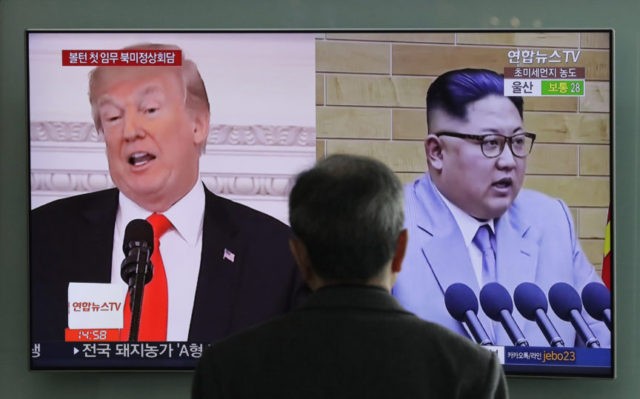The Chinese state newspaper Global Times advised the Trump administration in a column on Tuesday that denuclearizing North Korea would be impossible if the United States government was unwilling to pay Pyongyang “attractive rewards” for the move.
The North Korean communist regime announced last week that it would halt the development of nuclear weapons, but did not confirm that it would do so indefinitely, leading some experts to speculate that dictator Kim Jong-un made the announcement to curry favor with the free world while rebuilding the Punggye-ri Nuclear Test Site, suspected of having sustained significant damage during the nation’s latest nuclear test.
The declaration of suspending the nuclear weapons program precedes an in-person meeting between Kim Jong-un and South Korean President Moon Jae-in on Friday, as well as a similar summit between Kim and U.S. President Donald Trump to occur in either late May or early June.
The Global Times notes that reports from the United States indicate that Trump may demand Kim completely denuclearize within six months.
“Quick nuclear abandonment by Pyongyang is certainly a welcome thing. But such a sharp change could take place only if the US offers Pyongyang attractive rewards,” the newspaper posits, suggesting that “rewards” are necessary because there is no “strategic mutual trust” between the United States and North Korea. The Global Times does not go on to specify what those rewards would look like.
North Korea is currently under unprecedented global sanctions pressure, largely due to the government of China signing on to sanctions against the state imposed by the United Nations. China is North Korea’s largest trade partner and complained last year that it is Chinese businesses that have the most to lose when sanctions are imposed on North Korea. While supporting UN sanctions, China has opposed Washington-based sanctions against Chinese corporations that continue to illegally do business with North Korea.
As North Korea’s most committed patron, China has also taken the lead in giving Kim “rewards” for behavior it deems positive. Kim Jong-un made his first foreign visit as head of North Korea’s communist autocracy this month to China, taking a train to Beijing and discussing talks with South Korea and the United States with Xi Jinping. During that visit, Asian news outlets reported, Xi gifted Kim with an estimated $400,000-worth of gifts, including tableware and jewelry for his wife, Ri Sol-ju.
Yet China has vocally opposed North Korea’s nuclear program. In the column published Tuesday, the Global Times notes that China has a direct interest in seeing an end to the program because any nuclear disaster at the Punggye-ri site would result in an environmental disaster for China. The site lies just 70 miles from the Chinese border.
“North Korea’s Punggye-ri nuclear test site poses a long-term threat of nuclear leakage to Northeast China’s security,” the Global Times observes. “It’s of substantive significance for China that Pyongyang halted nuclear tests and closed up its test site, which also means substantial progress for South Korea.”
The status of the Punggye-ri site remains a matter of intense debate. This weekend, reports suggested that conducting multiple nuclear tests inside Mount Mantap, where the site is located, has hollowed out the mountain and rendered it extremely dangerous and “useless” for weapons testing. The site 38 North, which documents activity at the site, reported Tuesday that satellite images indicate “unusual” activity there in the past two weeks. While most of the site remains “quiet,” the site notes a collection of new mining carts and a new construction near the west portal. 38 North concludes it is too early to speculate what the purpose of these developments may be.
China appears to be using the nuclear dialogue to diminish America’s presence in Asia, which would allow the People’s Liberation Army (PLA) to expand its control over contested areas like the South China Sea. The Global Times demands in this week’s piece that Washington “stop threatening Pyongyang with military strikes and exclude the military option” in exchange for an end to the program.
Chinese officials have consistently demanded what Beijing calls a “freeze-for-freeze” approach, in which the North Koreans would slowly dismantle their nuclear program while the United States would remove unrelated military assets from Japan and South Korea. Washington has categorically rejected this approach, protesting that comparing the legitimate activities of the United States armed forces with North Korea’s illegal nuclear weapons program is a false equivalency.

COMMENTS
Please let us know if you're having issues with commenting.